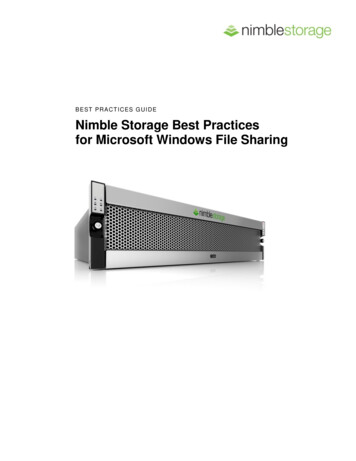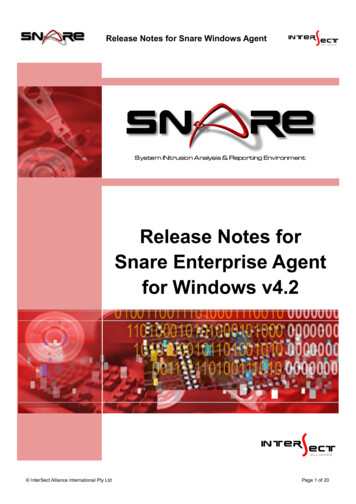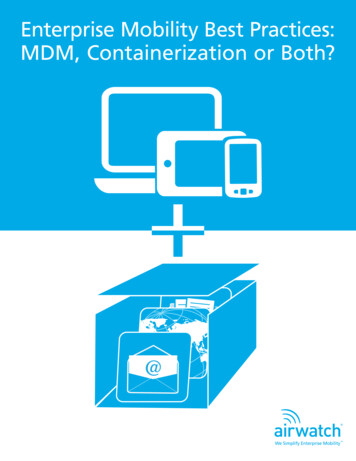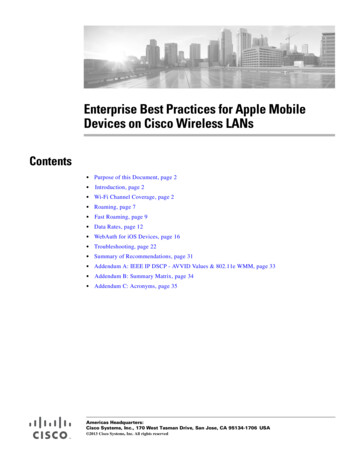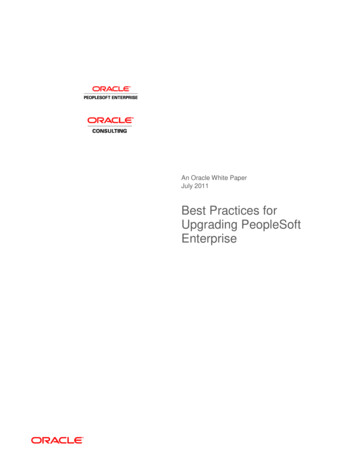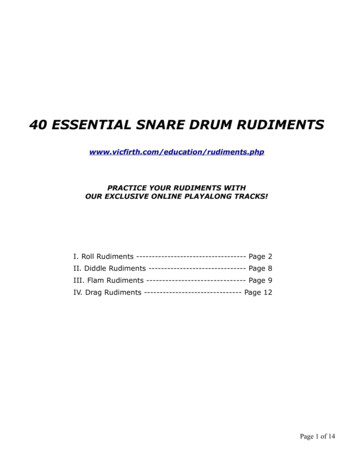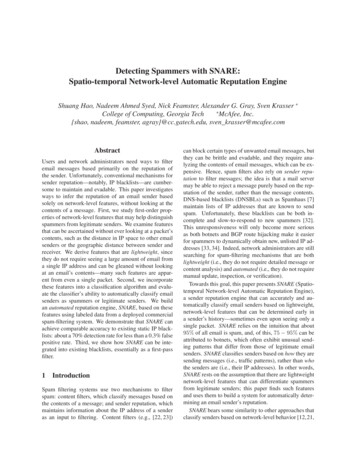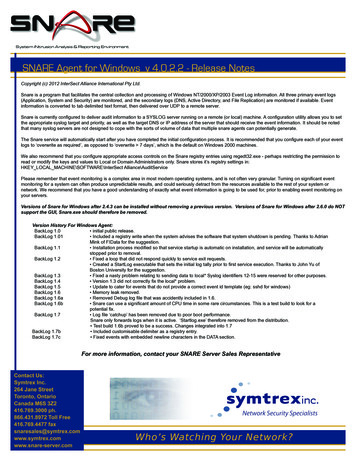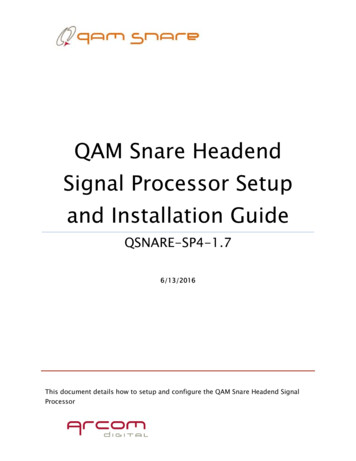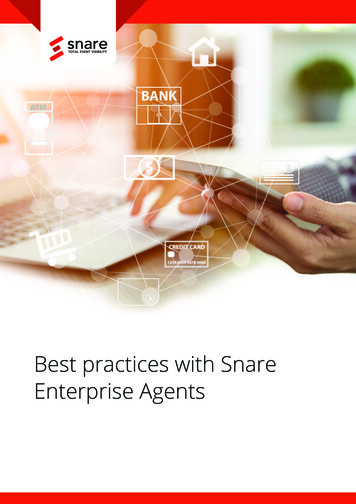
Transcription
Best practices with SnareEnterprise Agents
Snare Solutions
About this documentThe Payment Card Industry Data Security Standard (PCI/DSS) documentation providesguidance on a set of baseline security measures that are designed to reduce fraud relating tocredit cards, and to encourage the adoption of consistent security countermeasures acrossa range of businesses that are linked by the need to store or process payment card data.This document discusses the role of Snare agents in meeting PCI/DSS requirements. Snare SolutionsBEST PRACTICES WITH SNARE ENTERPRISE AGENTS SNARE3
IntroductionIf you are dealing with any form of payment card data you will need to comply with the PCI/DSS. FromMay 2018, security audits need to prove compliance with the current PCI/DSS 3.2.1. The Snare Enterpriseagent is configured to address these PCI/DSS requirements. Simply review the Enterprise Agent networkdestination and, if the host holds sensitive data in files or directories, then instigate the Snare FIM option(https://www.snaresolutions.com) to audit and monitor the relevant directories or files.The agents allow collection of local privileged user activity as well as key log files from systems to sendthem to a centralized logging system such as the Snare Server or third-party SIEM system. The Snareagent logging and auditing features meet the needs of PCI/DSS requirements for all Windows, Linux, MACOSX and Solaris-based systems.If you are running the unsupported Snare Open Source agent software for event logging, you will mostlikely fail your audit as they do not address two key aspects of the PCI/DSS V3 audit requirements:1. There is no technical, product, vendor or customer support because you are on anunsupported security tool/platform.2. More than half of the critical event log data is in the custom event logs, which are notprocessed by the Open Source agents, so forensic evidence is lost.Banks and regulators are stepping up their action in the face of recent significant breaches. Open Sourceagents are not supported and will not stand up to compliance or auditing standards (e.g. PCI/DSS), withmore than half of the critical logs not being captured including: privileged user activity system and group policy changes DHCP logs system time changes host firewall policy changes and access logs terminal service access print logs.Therefore, using Snare Open Source agents will risk failing audits and will not be able to detect all seriousmalicious attacks or unauthorized changes on your systems. This can lead to loss of customer data, majorbrand damage and significant financial penalties, depending on which standard has been failed and thedegree of damage caused. There are approximately 70 system event logs that will be missed by the OpenSource agents.4SNARE BEST PRACTICES WITH SNARE ENTERPRISE AGENTS Snare Solutions
Security standard overviewThe latest iteration of the PCI/DSS documentation (version 3.2.1), was released in May 2018. The securitystandard highlights a wide range of security practices that are designed to enhance the security of creditcard information and client details. PCI/DSS requirements should be considered a baseline requirement,and can be enhanced with additional controls to further mitigate risk. A full copy of the standard can befound at https://www.pcisecuritystandards.org/security standards/documents.php.PCI/DSS requirements apply if a primary account number (PAN) is stored, processed, or transmitted. If aPAN is not stored, processed, or transmitted, PCI/DSS requirements do not apply.Audit logging capabilities underpin a range of security measures within PCI/DSS, however requirement10 of the document specifically addresses logging and auditing. Requirement 10 is reproduced at theend of this document for reference.The Snare Enterprise Agents support organizational PCI/DSS security strategies, particularlyrequirement 10. Snare SolutionsBEST PRACTICES WITH SNARE ENTERPRISE AGENTS SNARE5
Audit collectionThe following recommendations highlight strategies that can be implemented on the Snare agents to meetevent collection, analysis and reporting requirements for systems, devices and applications that storeor process data covered by PCI/DSS. It is strongly recommended that any recommendations below beconsidered in the light of an organizational risk assessment and security policy.Servers used to host/processcardholder informationIn general, the following core event categories should be enabled: all management and security events logins and logouts (both failed and successful) accounts created and deleted events pertaining directly to the event/audit log.File event monitoring should be considered on those directories that store cardholder or sensitiveinformation. Care should be taken in employing file auditing, since it generally results in a large numberof system events being generated. File auditing or file integrity monitoring (FIM) should therefore be6SNARE BEST PRACTICES WITH SNARE ENTERPRISE AGENTS Snare Solutions
configured to monitor only those directories or files that store cardholder information and other sensitiveareas of the operating system. In situations where cardholder information is stored within a database,or managed exclusively by a custom application, database and/or application logs may be used to eithersupplement or supplant file related audit data, assuming: appropriate file level access controls are in place membership of groups that provide unrestricted access to the underlying data used by thedatabase or application are monitored the organizational risk assessment deems the risk acceptable.Applications and databases, in general, write audit log data to: an operating system log facility (e.g. Windows application log) an append-only, rotating, text-format log a database auditing log file a local or remote syslog server.Snare agents are available to monitor each of these destinations. Snare Enterprise coversoperating systems functions for Windows, Linux, Solaris and MAC OSX. Snare Enterprise Epilogcovers application text files and database audit log files. Snare Enterprise for MSSQL covers DBAactivity in SQL Server.The PCI/DSS also requires that “all actions taken by any individual with root or administrative privileges”are logged on any system that processes cardholder information. Unfortunately, older operating systemsare generally less capable of auditing at this level of granularity, particularly for file-related events. Mostmodern operating systems such as Windows and Unix can track user activities to a granular level.However, care should be taken with the objective settings to avoid unnecessary load on the systems.All systems should be time-synchronized to a central time source for log timestamp consistency. Snare SolutionsBEST PRACTICES WITH SNARE ENTERPRISE AGENTS SNARE7
General workstations and serversAll management and security events, logins and logouts both failed and successful, and accounts createdand deleted, should be logged from workstations and servers that do not directly store or processcardholder information. The Snare Agents used to collect such events should be configured to collect onlythose events to support this requirement to reduce the flood of information that would otherwise be sentback to a central collection server for analysis and processing.Process monitoring and file access auditing (also known as FIM) on these servers and workstationsis considered less critical, and the general audit strategy should be to collect event log data thatmay indicate that these systems are used as a jumping-off point to access other systems that hostcardholder information.In situations where general workstations are used as a transitory storage location for cardholderinformation (for example, spreadsheets), file auditing on the directories or files containing cardholderinformation that is used for transitory storage is strongly recommended to meet PCI/DSS compliance.All systems should be time-synchronized to a central time source for log timestamp consistency.Browsers/proxiesIf the primary interface to your cardholder information store is via a web browser, then browser and proxylog data may provide additional information on attacks against your user base.Monitoring proxy log data for websites that are accessed concurrently with your internal content,searching for known external problem sites that have poor reputation, or scanning logs for cross-sitescripting signatures may provide useful information regarding attempts to breach your cardholder data.8SNARE BEST PRACTICES WITH SNARE ENTERPRISE AGENTS Snare Solutions
Web serversIf the primary interface to your cardholder information store is via a web server/e-commerce system, logdata from the web server that hosts the user interface, as well as operating system log files, may providevaluable information on attacks or attempts to scan the server for vulnerabilities.Monitoring the log data for URL access attempts outside a known authorized subset can highlight attacksagainst the server itself. Scanning the logs for unexpected data content within ‘GET’ requests may alertadministrators to ‘fuzzing’ attacks against the web-based application itself and areas that are beingtargeted for SQL injection, command injection, buffer overflows or cross-site scripting attacks.All systems should be time-synchronized to a central time source for log timestamp consistency.Custom applicationsWhere a custom application provides access to cardholder information, log data from the underlyingoperating system, or web server in the case of http(s)-based applications, may not provide adequategranularity to meet PCI/DSS requirements.In situations where the application manages user authentication internally, and/or uses a mechanismto access data that would not be tracked or adequately segregated at the operating system level (e.g.a database or a related amalgamated storage mechanism), it is recommended that the applicationgenerates log information that ties authenticated users directly to the activity being performed.In summaryIn the past, Windows-based systems have only relied on three key logs: application; system; and security.With the advent of Windows 2008 and Vista, Windows systems now have many custom Windows eventlogs that contain administrative activity as well as other valuable logging activity from the host or network.The extra custom event logs are in common use for Windows 2012 and 2016 servers, and Windows 7 and10 desktop systems. These custom logs also need to be collected from systems.Administrative user accounts such as Windows administrators/domain admins/unix root user/SQL Serversysadmin users can override technical controls, copy and overwrite data. Therefore, these accounts needto be used only for authorized activity and by trusted staff. However auditing trust is difficult; all we cando is audit user activity. Hence PCI/DSS focuses on these administrative user aspects and ensuring thatall relevant logs are kept and stored securely away from the system that generated them, so they can't betampered with by a compromised account/system or rogue employee. Snare SolutionsBEST PRACTICES WITH SNARE ENTERPRISE AGENTS SNARE9
PCI/DSS standard overviewFrom the document:“The PCI DSS security requirements apply to all system components”.“In the context of PCI DSS, system components are defined as any network component,server, or application that is included in or connected to the cardholder data environment.System components also include any virtualization components such as virtual machines,virtual switches/routers, virtual appliances, virtual applications/desktops, and hypervisors”.“The cardholder data environment is comprised of people, processes and technology that store,process or transmit cardholder data or sensitive authentication data”.“Network components include but are not limited to firewalls, switches, routers, wireless accesspoints, network appliances, and other security appliances”.“Server types include, but are not limited to the following: web, application, database,authentication, mail, proxy, network time protocol (NTP), and domain name server (DNS)”.“Applications include all purchased and custom applications, including internal and external (forexample, Internet) applications”.Requirement 10: Track and monitor all access to network resources and cardholder data.Logging mechanisms and the ability to track user activities are critical in preventing, detecting, orminimizing the impact of a data compromise.The presence of logs in all environments allows thorough tracking, alerting, and analysis whensomething does go wrong. Determining the cause of a compromise is very difficult, if not impossible,without system activity logs.10.1 Implement audit trails to link all access to system components to each individual user.10.2 I mplement automated audit trails for all system components to reconstruct the followingevents:10.2.1 All individual user accesses to cardholder data10.2.2 All actions taken by any individual with root or administrative privileges10.2.3 Access to all audit trails10.2.4 Invalid logical access attempts10.2 5 U se of and changes to identification and authentication mechanisms—including but not limited to creation of new accounts and elevation ofprivileges—and all changes, additions, or deletions to accounts with rootor administrative privileges.10.2.6 Initialization stopping or pausing of the audit logs10.2.7 Creation and deletion of system-level objects.10SNARE BEST PRACTICES WITH SNARE ENTERPRISE AGENTS Snare Solutions
10.3 Record at least the following audit trail entries for all system components for each event:10.3.1 User identification10.3.2 Type of event10.3.3 Date and time10.3.4 Success or failure indication10.3.5 Origination of event10.3.6 Identity or name of affected data, system component, or resource.10.4 U sing time synchronization technology, synchronize all critical system clocks and times andensure that the following is implemented for acquiring, distributing, and storing time.10.4.1 Critical systems have the correct and consistent time.10.4.2 Time data is protected10.4.3 Time settings are received from industry-accepted time sources.10.5 Secure audit trails so they cannot be altered.10.5.1 Limit viewing of audit trails to those with a job-related need.10.5.2 Protect audit trail files from unauthorized modifications.10.5.3 P romptly back-up audit trail files to a centralized log server or media that isdifficult to alter.10.5.4 W rite logs for external-facing technologies onto a secure centralized internallog server or media device.10.5.5 U se file integrity monitoring or change detection software on logs to ensurethat existing log data cannot be changed without generating alerts (althoughnew data being added should not cause an alert).10.6 R eview logs and security events for all system components to identify anomalies orsuspicious activity. Note: Log harvesting, parsing, and alerting tools may be used to meetthis Requirement.10.6.1 Review the following at least daily: All security events Logs of all system components that store, process, or transmit CHD and/or SAD Logs of all critical system components Logs of all servers and system components that perform security functions (forexample, firewalls, intrusion-detection systems/intrusion-prevention systems(IDS/IPS), authentication servers, e-commerce redirection servers, etc.).10.6. 2 Review logs of all other system components periodically based on theorganization’s policies and risk management strategy, as determined by theorganization’s annual risk assessment.10.6.3 Follow up exceptions and anomalies identified during the review process10.7 R etain audit trail history for at least one year, with a minimum of three monthsimmediately available for analysis (for example, online, archived, or restorablefrom back-up). Snare SolutionsBEST PRACTICES WITH SNARE ENTERPRISE AGENTS SNARE11
10.8 Additional requirement for service providers only: Implement a process for the timelydetection and reporting of failures of critical security control systems, including but notlimited to failure of: Firewalls IDS/IPS FIM Anti-virus Physical access controls Logical access controls Audit logging mechanisms Segmentation controls (if used)Note: This requirement is a best practice until January 31, 2018, after which it becomes a requirement.10.8.1 A dditional requirement for service providers only: Respond to failures ofany critical security controls in a timely manner. Processes for responding tofailures in security controls must include: Restoring security functions Identifying and documenting the duration (date and time start to end) of thesecurity failure Identifying and documenting cause(s) of failure, including root cause, anddocumenting remediation required to address root cause Identifying and addressing any security issues that arose during the failure Performing a risk assessment to determine whether further actions arerequired as a result of the security failure Implementing controls to prevent cause of failure from reoccurring Resuming monitoring of security controlsNote: This requirement is a best practice until January 31, 2018, after which it becomes a requirement10.9 E nsure that security policies and operational procedures for monitoring all accessto network resources and cardholder data are documented, in use, and known toall affected parties12SNARE BEST PRACTICES WITH SNARE ENTERPRISE AGENTS Snare Solutions
Contact SnareAPAC 61 8 8213 1200apac@snaresolutions.com Snare SolutionsAmericas 1 (800) 834 1060americas@snaresolutions.comEMEA 44 (797) 090 5011emea@snaresolutions.comAdelaide (Head Office) 61 8 8213 1200Level 1, 76 Waymouth StAdelaide, SA 5000AustraliaBEST PRACTICES WITH SNARE ENTERPRISE AGENTS SNARE13ABN: 84 151 743 976
Snare agents are available to monitor each of these destinations. Snare Enterprise covers operating systems functions for Windows, Linux, Solaris and MAC OSX. Snare Enterprise Epilog covers application text files and database audit log f
